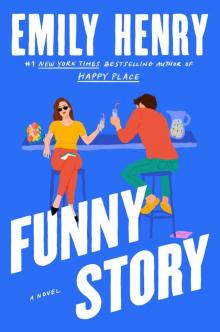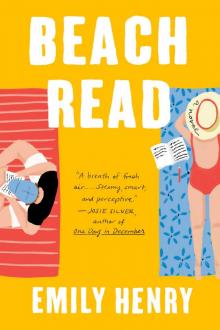Funny Story, page 1





TITLES BY EMILY HENRY
Funny Story
Happy Place
Book Lovers
People We Meet on Vacation
Beach Read
BERKLEY
An imprint of Penguin Random House LLC
penguinrandomhouse.com
Copyright © 2024 by Emily Henry Books, LLC
Penguin Random House supports copyright. Copyright fuels creativity, encourages diverse voices, promotes free speech, and creates a vibrant culture. Thank you for buying an authorized edition of this book and for complying with copyright laws by not reproducing, scanning, or distributing any part of it in any form without permission. You are supporting writers and allowing Penguin Random House to continue to publish books for every reader.
BERKLEY and the BERKLEY & B colophon are registered trademarks of Penguin Random House LLC.
Library of Congress Cataloging-in-Publication Data
Names: Henry, Emily, author.
Title: Funny story / Emily Henry.
Description: New York: Berkley, 2024.
Identifiers: LCCN 2023046632 (print) | LCCN 2023046633 (ebook) | ISBN 9780593441282 (hardcover) | ISBN 9780593441220 (ebook) | ISBN 9780593816486 (export edition)
Subjects: LCGFT: Romance fiction. | Novels.
Classification: LCC PS3608.E5715 F86 2024 (print) | LCC PS3608.E5715 (ebook) | DDC 813/.6—dc23/eng/20231010
LC record available at https://lccn.loc.gov/2023046632
LC ebook record available at https://lccn.loc.gov/2023046633
Cover design and illustration by Sandra Chiu
Book design by Alison Cnockaert, adapted for ebook by Molly Jeszke
This is a work of fiction. Names, characters, places, and incidents either are the product of the author’s imagination or are used fictitiously, and any resemblance to actual persons, living or dead, business establishments, events, or locales is entirely coincidental.
pid_prh_6.3_146746584_c0_r0
Contents
Cover
Titles by Emily Henry
Title Page
Copyright
Dedication
Chapter 1
Chapter 2
Chapter 3
Chapter 4
Chapter 5
Chapter 6
Chapter 7
Chapter 8
Chapter 9
Chapter 10
Chapter 11
Chapter 12
Chapter 13
Chapter 14
Chapter 15
Chapter 16
Chapter 17
Chapter 18
Chapter 19
Chapter 20
Chapter 21
Chapter 22
Chapter 23
Chapter 24
Chapter 25
Chapter 26
Chapter 27
Chapter 28
Chapter 29
Chapter 30
Chapter 31
Chapter 32
Chapter 33
Chapter 34
Chapter 35
Chapter 36
Chapter 37
Chapter 38
Acknowledgments
About the Author
_146746584_
For Bri, who picked me up from the airport the night we first met and drove me through a snowstorm without ever looking back. I struck gold with you.
1
WEDNESDAY, MAY 1ST
108 DAYS UNTIL I CAN LEAVE
Some people are natural storytellers. They know how to set the scene, find the right angle, when to pause for dramatic effect or breeze past inconvenient details.
I wouldn’t have become a librarian if I didn’t love stories, but I’ve never been great at telling my own.
If I had a penny for every time I interrupted my own anecdote to debate whether this actually had happened on a Tuesday, or if it had in fact been Thursday, then I’d have at least forty cents, and that’s way too big a chunk of my life wasted for way too small of a payout.
Peter, on the other hand, would have zero cents and a rapt audience.
I especially loved the way he told our story, about the day we met.
It was late spring, three years ago. We lived in Richmond at the time, a mere five blocks separating his sleek apartment in a renovated Italianate from my shabby-not-quite-chic version of the same kind of place.
On my way home from work, I detoured through the park, which I never did, but the weather was perfect. And I was wearing a floppy-brimmed hat, which I never had, but Mom mailed it to me the week before, and I felt like I owed it to her to at least try it out. I was reading as I walked—which I’d vowed to stop doing because I’d nearly caused a bike accident doing so weeks earlier—when suddenly, a warm breeze caught the hat’s brim. It lifted off my head and swooped over an azalea bush. Right to a tall, handsome blond man’s feet.
Peter said this felt like an invitation. Laughed, almost self-deprecatingly, as he added, “I’d never believed in fate before that.”
If it was fate, then it’s reasonable to assume fate a little bit hates me, because when he bent to retrieve the hat, another gust swept it into the air, and I chased after it right into a trash can.
The metal kind, bolted to the ground.
My hat landed atop a pile of discarded lo mein, the lip of the can smashed into my rib cage, and I did a wheezing pratfall into the grass. Peter described this as “adorably clumsy.”
He left out the part where I screamed a string of expletives.
“I fell in love with Daphne the moment I looked up from her hat,” he’d say, no mention of the trash-noodles in my hair.
When he asked if I was okay, I said, “Did I kill a bicyclist?”
He thought I’d hit my head. (Nope, just bad at first impressions.)
Over the last three years, Peter dusted off Our Story every chance he got. I was sure he’d work it into both our vows and his wedding reception speech.
But then his bachelor party happened, and everything changed.
The story tipped onto its side. Found a fresh point of view. And in this new telling of it, I was no longer the leading lady, but instead the teensy complication that would forever be used to jazz up their story.
Daphne Vincent, the librarian that Peter plucked out of the trash, nearly married, then dumped the morning after his bachelor party for his “platonic” “best” “friend,” Petra Comer.
Then again, when would he even need to tell their story?
Everyone around Peter Collins and Petra Comer knew their history: How they’d met in third grade when forced into alphabetical seating, bonding over a shared love of Pokémon. How, soon after, their mothers became friends while chaperoning an aquarium field trip, with their fathers to follow suit.
For the last quarter of a century, the Collinses and the Comers vacationed together. They celebrated birthdays, ate Christmas brunches, decorated their homes with handmade picture frames from which Peter’s and Petra’s faces beamed out beneath some iteration of the phrase BEST FRIENDS FOREVER.
This, Peter told me, made him and the most gorgeous woman I’d ever met more like cousins than friends.
As a librarian, I really should’ve taken a moment to think about Mansfield Park or Wuthering Heights, all those love stories and twisted Gothics wherein two protagonists, raised side by side, reach adulthood and proclaim their undying love for each other.
But I didn’t.
So now here I am, sitting in a tiny apartment, scrolling through Petra’s public social media, seeing every detail of her new courtship with my ex-fiancé.
From the next room, Jamie O’Neal’s rendition of “All By Myself” plays loudly enough to make the coffee table shiver. My next-door neighbor, Mr. Dorner, pounds on the wall.
I barely hear it, because I’ve just reached a picture of Peter and Petra, sandwiched between both sets of their parents, on the shore of Lake Michigan—six abnormally attractive people smiling abnormally white smiles over the caption, The best things in life are worth waiting for.
As if on cue, the music ratchets up.
I slam my computer shut and peel myself off the sofa. This apartment was built pre–global warming, when Northern Michiganders had no need for air-conditioning, but it’s only May first and already the apartment turns into a brick oven around midday.
I cross to the bedroom hallway and knock on Miles’s door. He doesn’t hear me over Jamie. I escalate to pounding.
The music stops.
Footsteps shuffle closer. The door swings open, and a weed fog wafts out.
My roommate’s dark brown eyes are ringed in pink, and he’s in nothing but a pair of boxers and a funky knitted afghan wrapped around his shoulders like a very sad cape. Considering the overall climate of our hotbox apartment, I can only assume this is for modesty’s sake. Seems like overkill for a man who, just last night, forgot I lived with him long enough to take a whole-ass shower with the door wide open.
His chocolate-brown hair sticks up in every direction. His matching beard is pure chaos. He clears his throat. “What’s up.”
“Everything okay?” I ask, because while I’m used to a disheveled Miles, I’m less used to hearing him blast the saddest song in the world.
“Could you turn the music down,” I say.
“I’m not listening to music,” he says, dead serious.
“Well, you paused it,” I say, in case he really is simply too high to remember more than three seconds back. “But it’s really loud.”
He scratches one eyebrow with the back of his knuckle, frowning. “I’m watching a movie,” he says. “But I can turn it down. Sorry.”
Without even meaning to, I’m peering over his shoulder to get a better look.
Unlike the rest of our apartment, which was perfectly tidy when I arrived and is still perfectly tidy, his room is disastrous. Half of his records are stacked atop the milk crates they ostensibly belong inside. His bed is unmade, a rumpled comforter and the sheet untucked all the way around. Two tattered flannel shirts hang out of his mostly closed dresser drawers, like little ghosts he’s pinned there, midescape.
In direct opposition to the creams and taupes of my room, his is a messy, cozy mix of rusts, mustards, seventies greens. Where my books are neatly organized along my bookcase and the shelf I installed above my window, his (very few) are face down, spines cracked, on the floor. Electronics manuals, loose tools, and an open bag of Sour Patch Kids are scattered across his desk, and on his windowsill, a stick of incense burns between a few surprisingly vivacious houseplants.
His TV, though, is what catches my eye. Onscreen is the image of a thirty-year-old Renée Zellweger, sporting red pajamas and belting a song into a rolled-up magazine.
“Oh my god, Miles,” I say.
“What?” he says.
“You’re watching Bridget Jones’s Diary?”
“It’s a good movie!” he cries, a little defensive.
“It’s a great movie,” I say, “but this scene is, like, one minute long.”
He sniffs. “So?”
“So why has it been playing for at least”—I check my phone—“the last eight minutes?”
His dark brows knit together. “Did you need something, Daphne?”
“Could you just turn it down?” I say. “All the plates are rattling in the cabinets and Mr. Dorner’s trying to bust down the living room wall.”
Another sniff. “You want to watch?” he offers.
In there?
Too big of a tetanus risk. An ungenerous thought, sure, but I have recently tapped out my supply of generosity. That’s what happens when your life partner leaves you for the nicest, sunniest, prettiest woman in the state of Michigan.
“I’m good,” I tell Miles.
We both just stand there. This is as much as we ever interact. I’m about to break the record. My throat tickles. My eyes burn. I add, “And could you please not smoke inside?”
I would’ve asked sooner, except that, technically, the apartment is his. He did me a huge favor letting me move in.
Then again, it’s not like he had many options. His girlfriend had just moved out.
Into my apartment.
With my fiancé.
He needed to replace Petra’s half of their shared rent. I needed a place to sleep. Did I say sleep? I meant weep.
But I’ve been here three weeks now, and I’m tired of showing up to work smelling like I came straight from the least famous of the Grateful Dead’s spin-off bands’ concerts.
“I stick my head out the window,” Miles says.
“What,” I say.
Immediately I picture a chocolate Labrador riding in a car, its mouth open and eyes squinting into the wind. The few times Miles and I met before all this, on awkward double dates with our now-partnered partners, that’s what he’d reminded me of. Friendly and wiry with an upturned nose that made him look a bit impish, and teeth that were somehow too perfect in contrast to his scruffy face.
The toll of the last three weeks has given him a slightly feral edge—a Labrador bitten by a werewolf and dumped back at the pound. Relatable, honestly.
“I stick my head out the window when I smoke,” he clarifies.
“Okay,” I say. That’s all I’ve got. I turn to go.
“You sure you don’t want to watch the movie?” he says.
Oh, god.
The truth is, Miles seems like a nice guy. A really nice guy! And I imagine that what he’s feeling right now must be comparable to my own total emotional decimation. I could take him up on his offer, go sit in his room on an unmade bed and watch a romantic comedy while absorbing fifteen hundred grams of weed smoke via my pores. Maybe it would be nice even, to pretend for a bit that we’re friends rather than strangers trapped together in this nightmare of a breakup.
But there are better uses of my Wednesday night.
“Maybe some other time,” I say, and go back to my computer to continue looking for new jobs, far away from Peter and Petra, and far away from Waning Bay, Michigan.
I wonder if Antarctica is in need of a children’s librarian.
One hundred and eight days, and then I’m out of here.
2
BACK IN APRIL
BEFORE I KNEW I NEEDED TO LEAVE
Here’s how the rest of the story goes, when I’m the one telling it: Peter Collins and I fell in love one day in the park, when the wind swept my hat from my head.
I am arguably the world’s worst small-talker, but he didn’t want to small-talk.
When I told him the hat was a gift from my mother, he wanted to know if we were close, where she lived now, what the gift was for, and by the way, Happy birthday, are you a birthday person? And when I told him, Thank you, and yes, yes, I am, he volunteered that he was too, that his family always treated birthdays like huge personal successes rather than markers of time. And when I told him that sounded beautiful, the birthdays and his family, he said, They’re the reason I’ve always wanted a big family of my own someday, and at that point, I already would’ve been a goner, even if he hadn’t asked me right then, as if there wasn’t garbage sticking to my chestnut-brown hair, What about you? Do you want a big family?
Dating in my late twenties had been hell. This was the kind of question I’d usually ask right before the guy on the other end of the phone ghosted me. As if it had been a formal proposition: Should we skip grabbing a drink and maybe freeze some embryos, just in case?
Peter was different. Stable, steady, practical. The kind of person I could imagine trusting, which didn’t come naturally to me.
Within five weeks, we’d moved in together, synced our lives, friend groups, and schedules. At the first over-the-top birthday party I ever threw him, Peter’s and my respective best friends in Richmond, Cooper and Sadie, hit it off and started dating too.
Within a year, Peter proposed. I said yes.
A year later, while wedding planning, we started looking for a house to buy. His parents, two of the loveliest people I’ve ever met, sent him the listing for a gorgeous old house not far from them in the lakeside Michigan town he’d grown up in.
He’d always wanted to get back there, and now that his software development job had gone remote, nothing was stopping him.
My mom lived in Maryland by then. My dad, a title that really deserves to have scare quotes around it, was out in Southern California. Sadie and Cooper were toying with the possibility of moving to Denver.
And as much as I loved my job in Richmond, what I really wanted—what I’d always wanted—was to be a children’s librarian, and lo and behold, the Waning Bay Public Library was looking to fill that exact position.
So we bought the house in Michigan.
Well, he bought it. I had terrible credit and slim savings. He covered the down payment and insisted on paying the mortgage.
He’d always been so generous, but it felt like too much. Sadie didn’t understand my hang-ups—I let Cooper pay for literally everything, she’d say, he makes a shit-ton more than me—but Sadie hadn’t been raised by Holly Vincent.
There was no way my badass, hyperindependent mother would approve of me relying on Peter so heavily, and so I didn’t approve either.
He came up with a compromise: I’d furnish the place, add piecemeal to the assortment of furniture we’d brought from Richmond, while he covered the bills.
Most of his far-flung friends had cushy white-collar jobs and could afford to take a separate trip for his bachelor party. Whereas Sadie and the rest of my friends were mostly other librarians—or booksellers, or aspiring writers—who couldn’t afford two separate trips. Thus, she and Cooper would fly in a few days before the summer ceremony instead, and we’d do my bachelorette then.

















